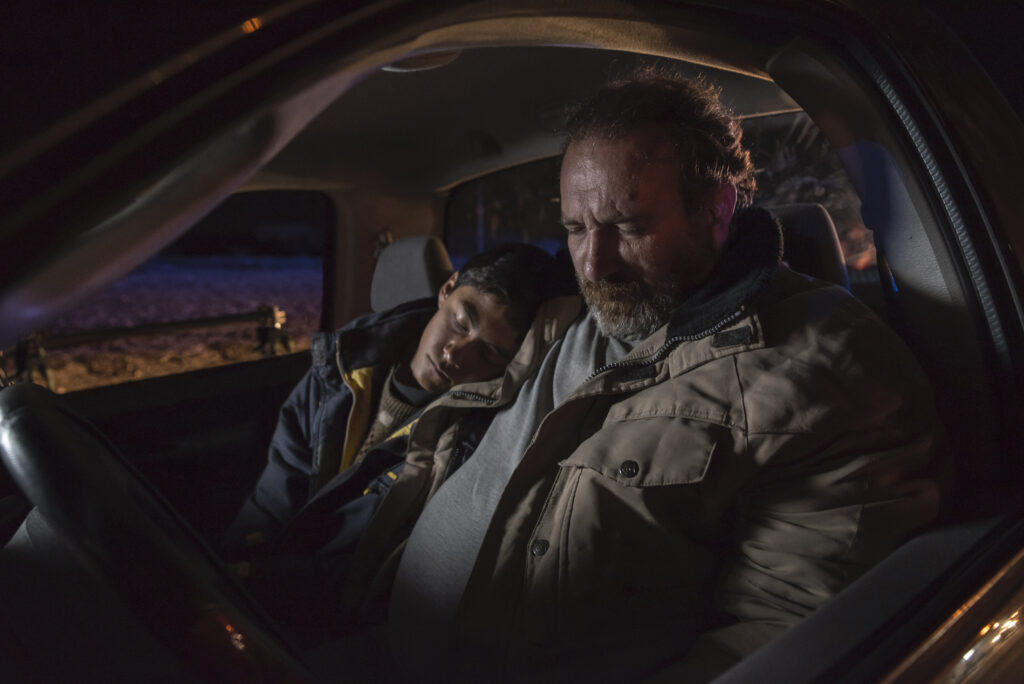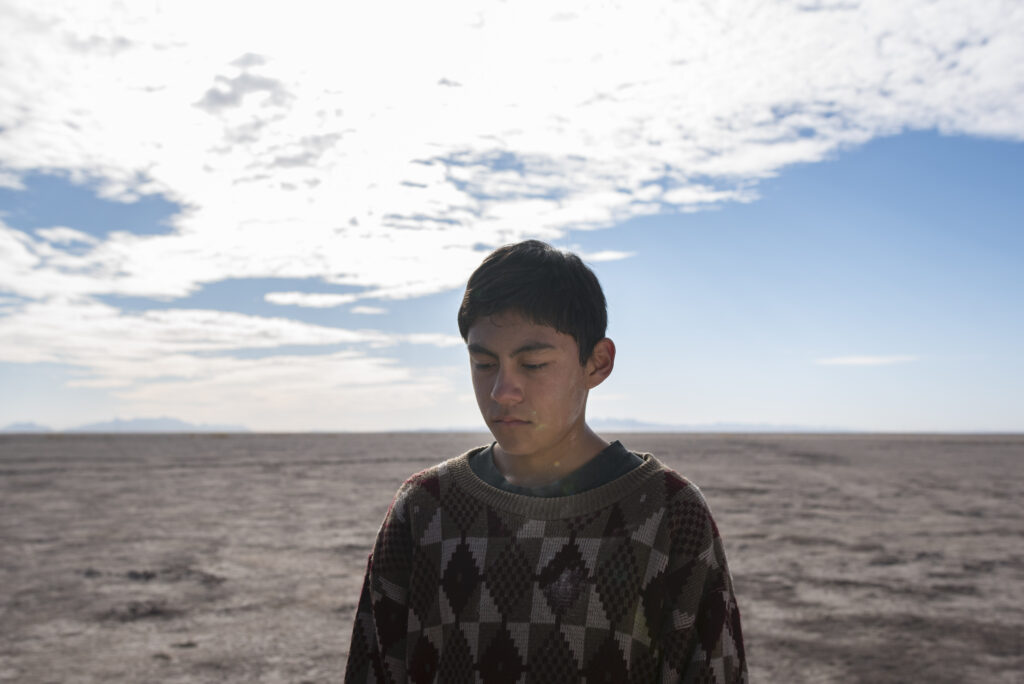March 16, 2023
by Carla Hay

Directed by Lorenzo Vigas
Spanish with subtitles
Culture Representation: Taking place in Mexico, the dramatic film “The Box” features a Latino cast of characters representing the working-class and middle-class.
Culture Clash: After a 13-year-old boy travels from Mexico City to get the cremated remains of his long-lost father, he meets a factory worker who looks like the boy’s father, but with a different name, and they form an uneasy father-son type of relationship.
Culture Audience: “The Box” will appeal primarily to people who want to see compelling stories about family identities and worker exploitation.

“The Box” is a “slow burn” movie that starts off a little sluggishly, but the story gets more compelling toward the last half of the film. It’s a solid and well-acted drama that can hold viewers’ interest, even when the movie drags on for a little too long, and a family secret is too easy to predict before it’s revealed. “The Box” has familiar themes in coming-of-age stories about the loss of innocence while trying to define one’s own self-identity.
Directed by Lorenzo Vigas, “The Box” had its world premiere at the 2021 Venice International Film Festival. Vigas co-wrote the movie’s screenplay with Paula Markovitch and Laura Santullo. “The Box” was Venezuela’s official entry for the 2023 Academy Awards for the category of Best International Feature Film. (The movie didn’t an an Oscar nomination.) Even though “The Box” takes place in Mexico, it’s considered a Venezuelan movie for awards eligibility, because Vigas is Venezuelan, and the movie was financed by Venezuelan production companies.
In the beginning of “The Box,” a 13-year-old boy named Hatzín (played by Hatzín Navarrete) travels alone by bus from his hometown of Mexico City to an unnamed city in Mexico. The purpose of this trip is so he can claim the cremated remains of a person he is told is his long-lost father, who was found in a mass grave. Mass graves of murdered people (many of whom remain unidentified and unclaimed) have become a big social problem in Mexico, which “The Box” acknowledges in ways that serves as a menacing backdrop for the story.
Hatzín’s father, whose name is Esteban Espinosa Leyva, disappeared from the family when Hatzín was too young to remember. Hatzín (who is an only child) is being raised by Hatzín’s maternal grandmother, who has diabetes and is unable to travel. Hatzín’s mother is deceased.
Hatzín is a quiet and introverted child who has mixed feelings about this trip. On the one hand, he is sad that there’s no chance that his father will reunite with the family. On the other hand, he’s relieved to be out of his household, since he isn’t very happy there. His grandmother isn’t neglectful or abusive, but the movie repeatedly drops hints that Hatzín is lonely and doesn’t feel complete without having a father figure in his life.
Hatzín has a letter of authorization from his grandmother to have the cremated remains released to Hatzín. When he arrives at the center where unclaimed bodies are being kept, Hatzín gets the cremated remains in a metal box (which looks like a pet-sized coffin), as well as his father’s photo ID, which he is told was found with his father’s body. Because Hatzín doesn’t really remember what his father looks like, he assumes that everything on the ID is correct.
Hatzín is about take a bus to go back home when, by sheer coincidence, he sees a man walking on a street who looks exactly like the man on the photo ID of his father. Hatzín approaches the man and asks him if his name is Esteban Espinosa Leyva. The stranger (played by Hernán Mendoza) is friendly and says that his name is Mario Enderle. Mario tells Hatzín that this is a case of mistaken identity.
Hatzín insists that there is no mistake, while Mario says there is. Mario looks amused and then slightly uncomfortable when Hatzín follows Mario into a shop. Hatzín tells Mario there is no mistake, because he remembers interacting with Mario when Hatzín was younger. Mario tells Hatzín to go away. But Hatzín can’t let go of the feeling that something isn’t quite right about what he’s been told about his father being dead.
Hatzín then decides to act like a private detective. He secretly follows Mario to a factory where Mario works, and then he follows Mario to a few other places. After asking some questions to factory employees and doing some more snooping around, Hatzín finds out that Mario spends a lot of his time recruiting people to work in the factory.
Hatzín confronts Mario again. And this time, he’s brought the photo ID as proof. Mario says it must be a fake ID using a stolen photograph. Hatzín explains that if his father is still alive, he wants to find him, but Mario in unmoved by this sob story. Mario is so annoyed by Hatzín, he drives Hatzín to the nearest bus station and tells Hatzín to go home.
But Hatzín won’t go home. The next day, Mario finds Hatzín asleep in Mario’s truck. “Didn’t I tell you to leave?” Mario yells at Hatzín. In response, Hatzín says that he doesn’t want to go home. Mario says to Hatzín: “You crazy fucker.” And so, these two strangers begin a tension-filled rapport that starts to turn into a father-son type of relationship.
It isn’t long before Mario makes Hatzín his apprentice. Hatzín is eager and willing to impress Mario, who says his dream is to have his own factory. Mario says that if he ever gets his own factory, he will hire Hatzín to work there. Hatzín likes this idea, because he has no intention of going back to Mexico City. Hatzín occasionally calls his worried grandmother, but he tells her that he’s found a job, and he’s not coming back home.
Hatzín is a dutiful and loyal protégé to Mario, but Hatzín is curious to find out more about Mario, who does not have an identifiable Mexican accent. Hatzín asks a factory worker if Mario is really from Mexico. The worker says yes, while also mentioning that Mario is from the city of Chihuahua. Hatzín also hears the workers talk about Mario’s generosity. For example, one of the workers says that Mario helped the worker’s mother (who has intestinal problems) go to a hospital.
Mario started off trying to get rid of Hatzín when they first met, but Mario soon comes to rely on Hatzín for many things that go beyond what a kid should be doing. For example, there’s a scene where Mario is shortchanged on his commission, and he orders an obedient Hatzín to go back to the office and get the money that Mario is owed. It’s a salary dispute that Mario should have handled himself, and not put the burden on Hatzín.
Viewers with enough life experience can see the movie’s several indications that Mario isn’t all that he first appears to be. The way that Mario handled the commission dispute, by ordering Hatzín to get the money, is really Mario’s way of testing Hatzín to see how loyal Hatzín will be to Mario. Because “The Box” is told from Hatzín’s perspective (which is a very naïve perspective at first), it takes quite a while before Hatzín starts to see who the real Mario is.
It should come as no surprise that Hatzín finds out that the recruitment of factory workers isn’t as straightforward as it seems to be. One of the things that Hatzín discovers is that many of these workers are deliberately exploited by not getting the payment that is owed to them. There are other shady things about the factory that are eventually revealed in the movie, which has some obvious foreshadowing of these revelations.
“The Box” has several cast members, but the movie’s only real character development is for Hatzín and Mario. “The Box” shows Hatzín’s almost desperate willingness to find his identity in whatever father figure pays enough attention to him. The cremation box is a symbol of not only the past that Hatzín wants to leave behind but also a past that he wants more answers to in his motivations to find out more about his father.
Navarrete makes his feature-film debut as Hatzín, a character he portrays with a lot of naturalism and credibility. Mendoza also gives an impressive performance as Mario, a character with many layers to his personality. Mario easily displays some of those layers to the world, while keeping other layers well-hidden. “The Box” is ultimately a cautionary tale about giving other people or things too much power in defining who you are, when that definition should really come from within yourself.
MUBI released “The Box” in New York City on November 4, 2022. The movie premiered on MUBI on November 11, 2022.
